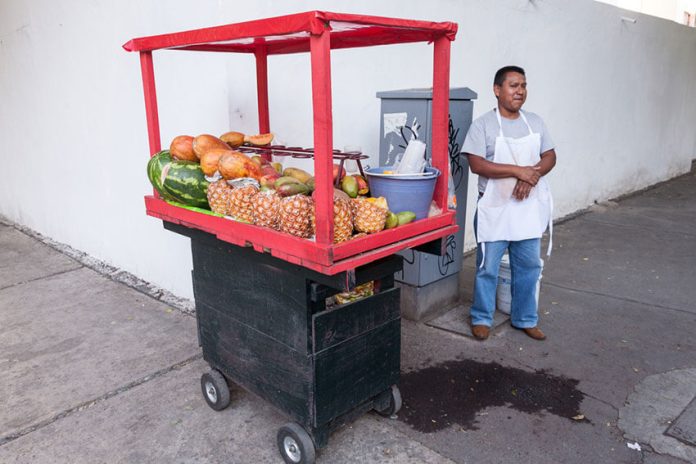Small business owners, street vendors and others were forced to fork out considerably more in 2021 to meet the extortion demands of criminal groups.
So-called derecho de piso fees increased from 20% to 45% this year, according to business owners in 10 states who spoke with the newspaper Milenio.
The incidence of extortion also rose, according to official data, with reported cases up 11% in the first 11 months of the year compared to the same period of 2020.
Extortionists – members of large criminal organizations such as the Jalisco New Generation Cartel (CJNG) and the Sinaloa Cartel in some cases – are demanding payments from individuals of up to 15,000 pesos (US $730) a month, Milenio reported.
Fresh chicken vendors, proprietors of tienditas (small grocery stores), ambulantes (street vendors), truck drivers and even prostitutes are among those subjected to extortion demands. Larger establishments such as restaurants, bars and casinos are also targeted by criminals, who pressure them to make even larger payments.
México state is the country’s extortion capital with 37% of cases occurring there between January and August. There were more than 2,100 reported cases in the period, an increase of 8% compared to the same period last year.
However, the real number of cases is almost certainly much higher as many victims keep quiet out of fear. State capital Toluca and municipalities in the greater Mexico City metropolitan have been identified as extortion hotspots in Mexico’s most populous entity.
The Sinaloa Cartel, the CJNG, the Gulf Cartel, the Familia Michoacana and a range of other smaller criminal organizations are all believed to be involved in the extortion racket in México state.
Extortion cases also increased this year in Mexico City, where more than 400 – undoubtedly a vast undercount – were reported between January and September.
The owner of a store selling chicken, who started his business less than three months ago, told Milenio that he received a written message demanding a weekly derecho de piso payment.
Ricardo said the note included a telephone number to which he sent a message to confirm he would pay. He chose to yield to the extortionists’ demand rather than suffer the inevitable consequences that non-compliance would bring.

Several criminal organizations demand extortion payments from businesses in the capital, including La Unión de Tepito, the CJNG and the Familia Michoacana.
Another extortion hotspot is Puebla city, where cases spiked at least 20% this year, according to the Puebla Citizens Security and Justice Council, a non-governmental organization. One group of extortionists operating in the historic center of the capital is called Fuerza 2000, Milenio reported.
It charges small businesses 2,000 pesos (about US $100) a month for “security” and street vendors a “voluntary fee” of up to 500 pesos every fortnight, the newspaper said.
Sex workers have also been targeted: one group of Puebla prostitutes reported in October that a man known as “El Viejo Matus” threatened to abduct them, beat them and kill them if they didn’t hand over 300 pesos each every day.
Among the other criminal groups involved in extortion in Puebla city are Los Fedes, Los Rojos and Los Pelones.
Small business owners and street vendors in several other states including Jalisco and Tamaulipas also told Milenio that criminals are demanding higher derecho de piso fees.
In one central neighborhood of Guadalajara, the capital of Jalisco, men who introduce themselves as CJNG members demand weekly payments and threaten violence if businesses don’t comply. One man who sells chopped fruit from a tricycle said he pays 1,000 pesos a week to avoid trouble.
Only about 300 extortion cases have been reported in Jalisco this year but, as is the case in other states, the vast majority go unreported. According to the national statistics agency INEGI, some 97% of extortion cases are not taken to authorities, mostly due to victims’ fear of repercussions.
With reports from Milenio
